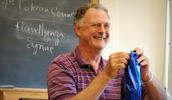Lee Patterson
Frederick W. Hilles Professor of English
 Lee Patterson, B.A., Ph.D. Yale University, faculty member at Yale since 1994, you are one of the foremost medievalists of your generation. In Medieval Studies writ large your work has reminded scholars that interpretive philology can benefit from a fuller and more fully acknowledged saturation in social history. Once called a “high octane scholar” by another medievalist, your five books and dozens of “most-cited” paradigm-shifting essays over four decades have made you the Grand Vizier to studies in the Age of Chaucer. Your brilliant work, Chaucer and the Subject of History locates in Chaucer a modern conception of the self as autonomous and self-made, as opposed to a medieval conception of the self as a part of a social group or product of determinative historical processes. It was awarded the Choice Outstanding Academic Book prize for 1992 as well as the coveted Christian Gauss Award of Phi Beta Kappa for the best book of literary criticism. When it was published, the journal of the Medieval Academy of America called this landmark work “probably the best book ever written on Chaucer”—quite a statement from such an unimpeachable source, considering Chaucer scholarship.
Lee Patterson, B.A., Ph.D. Yale University, faculty member at Yale since 1994, you are one of the foremost medievalists of your generation. In Medieval Studies writ large your work has reminded scholars that interpretive philology can benefit from a fuller and more fully acknowledged saturation in social history. Once called a “high octane scholar” by another medievalist, your five books and dozens of “most-cited” paradigm-shifting essays over four decades have made you the Grand Vizier to studies in the Age of Chaucer. Your brilliant work, Chaucer and the Subject of History locates in Chaucer a modern conception of the self as autonomous and self-made, as opposed to a medieval conception of the self as a part of a social group or product of determinative historical processes. It was awarded the Choice Outstanding Academic Book prize for 1992 as well as the coveted Christian Gauss Award of Phi Beta Kappa for the best book of literary criticism. When it was published, the journal of the Medieval Academy of America called this landmark work “probably the best book ever written on Chaucer”—quite a statement from such an unimpeachable source, considering Chaucer scholarship.
“First he wrought and afterward he taught.” (from the Parson’s Tale) Although your degrees are from Yale, you had a long career before you arrived back here to teach, with impressive tenures at the University of Toronto, Johns Hopkins, and Duke. Your experience at other institutions made you a dedicated foe of parochialism and provincialism and you have insisted on a wide view of scholarship and teaching throughout your Yale career. Always a highly regarded and excellent teacher of lectures as well as seminars, your erudition and your standing as a scholar make it all the more impressive that over the years you have done a tremendous amount of teaching, not only to undergraduates and graduate students, but also to secondary school teachers. You have led six NEH seminars, four of them at Yale, spent five summers teaching at Breadloaf and have been a dedicated proponent of pedagogy that could touch the widest possible audience and to activism in charitable organizations that promoted this same end. As you retire, Yale proudly salutes one of its own, thanking you for category-breaking thinking, high scholarship, wide vision, and teaching that seeks to makes a real difference to the world.
Tribute Editor: Penelope Laurans